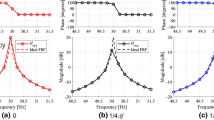Abstract
This paper presents an Optimized Rational Fraction Polynomial (ORFP) approach for modal parameters estimation from the measurements of the Frequency Response Function (FRF). Although this approach is based on the Rational Fraction Polynomial (RFP) technique described in [1], it suggests the use of a constrained optimization scheme rather than the Forsythe method to overcome the shortcomings of the Forsythe method. The latter are the estimation of modal parameters that do not necessarily describe a stable system and the estimation of fictitious natural frequencies. The formulation of the constrained optimization problem is presented and discussed. The assessment of the performance of the ORFP approach showed that it is better than the RFP approach in terms of its ability to identify modal parameters that ensure a stable system and its flexibility in selecting and setting the natural frequencies of the system. Several illustrative examples are given to demonstrate the robustness of the ORFP approach.
Similar content being viewed by others
References
L. Kelly, Handbook of Numerical Methods and Applications, Addison-Wesley Publishing Company, New York, USA, (1967).
M. Richardson, Global frequency & damping estimates from frequency response measurements. 4th IMAC Conference, Los Angelus, California, USA, (1986) 1–7.
N. Maia and J. Silva, Theoretical and Experimental Modal Analysis, John Wiley & Sons Inc., New York, USA, (1997).
M. Richardson and D. Formenti, Parameter estimation from frequency response measurements using rational fraction polynomials, In 1st IMAC Conference, Orlando, Florida, USA. (1982) 1–15.
W. Ewins, Modal Testing: Theory and Practice, John Wiley & Sons Inc., New York, USA, (1984).
N. M. M. Maia and D. J. Ewins, A new approach for the modal identification of lightly damped structures, Mechanical Systems & Signal Processing 3(2) (1989) 173–193.
B. Schwarz and M. Richardson, Experimental modal analysis, Technical report, Vibrant Technology Inc., (1999).
Y. Tamura, Damping in building, Technical report, Tokyo Polytechnic University, Japan, (2006).
D. L. Brown, R. J. Allemang, R. Zimmerman and M. Mergeay, Parameter estimation techniques for modal analysis, SAE Technical paper series,(790221).
A. Iglesias, Investigating various modal analysis extraction techniques to estimate damping ratio, Master’s thesis, Virginia Polytechnic Institute and State University, Blacksburg, Virginia, (2000).
S. R. Ibrahim, Modal identification techniques assessment and comparison. Proc. of the 10th International Seminar on Modal Analysis, Part III.
Author information
Authors and Affiliations
Corresponding author
Additional information
This paper was recommended for publication in revised form by Associate Editor Seockhyun Kim
O. Omar — B.Sc. Cairo University, Giza, Egypt, 1998. M.Sc. McMaster University, Hamilton, ON, Canada, 2003. PhD candidate in the Department of Mechanical Engineering, McMaster University. Research areas are in high speed machining, metal cutting, system dynamics, modal analysis, surface generation, end-milling, and optimization. Currently works as a Mechanical Designer, EIT, JNE Consulting Ltd., Hamilton, ON.
Rights and permissions
About this article
Cite this article
Omar, O., Tounsi, N., Ng, EG. et al. An optimized rational fraction polynomial approach for modal parameters estimation from FRF measurements. J Mech Sci Technol 24, 831–842 (2010). https://doi.org/10.1007/s12206-010-0123-z
Received:
Revised:
Accepted:
Published:
Issue Date:
DOI: https://doi.org/10.1007/s12206-010-0123-z




